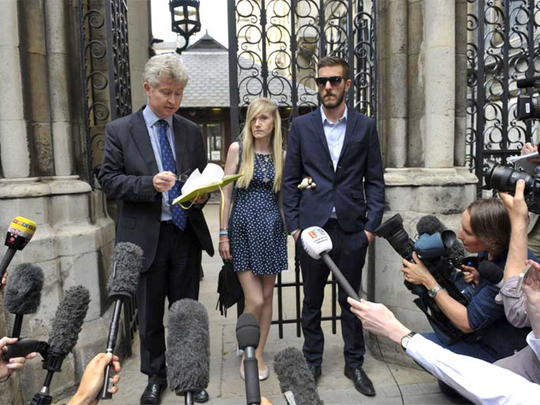
We always describe the infinity of our love for our children in the most violent and abysmal terms.
We’d take their place in any torture, leap in front of a flying bullet for them: Non-parents, not unreasonably, hear a note of savage and distasteful pride in it.
It isn’t really anything to be proud of, protecting your own to the destruction of all else, even if “all else” includes yourself.
Also Read: The heart-breaking case of Charlie Gard
But it’s not really pride the parent is describing: It’s terror. It is a horrific realisation, having lived a life of what’s-the-worst-that-could-happen? Nonchalance, to know how bottomless that worst could be.
Acceptance
Yet, radical barbarism and self-sacrifice are almost never what’s required when your child is in jeopardy in real life:
Rather, qualities that are so far out of reach that they are neither superhuman nor inhuman, simply impossible.
The dispassionate acceptance of a reality that is unacceptable; the clear-sighted evaluation of a situation that cannot be borne.
In all the judgements handed down in the case of Charlie Gard, first in the London High Court, then the court of appeal, then in the United Kingdom Supreme Court, and finally in the European court of human rights, the point has been sorrowfully made that the baby’s interests must come first.
The baby, who has mitochondrial DNA depletion syndrome, cannot be allowed treatment, in the United States or anywhere else, that will only prolong his suffering, and which brings no plausible hope.
This formulation — of the child’s interests protected from the passions of his parents by the impartial court — must seem so meaningless to his mother and father, Chris Gard and Connie Yates. They are the guardians of his thirst for life, holding his survival in trust for him until he’s strong enough to ensure it for himself. That’s what parenting is. It cannot be reasoned with, and persists way past babyhood.
Tony Bland, the 96th victim of the Hillsbrough tragedy, was 18 when he suffered injuries at the football ground that left him in a persistent vegetative state.
It was four years before his parents were able to accept that there was no reasonable expectation of recovery.
To all the gruesome precedents set by that disaster, Tony Bland’s death added the first instance and, for the first time in English legal history, a patient’s life-prolonging treatment — food and water — was withdrawn in the interests of his dignity.
In the first grip of tragedy, as Gard and Yates undoubtedly are — Charlie is only 11 months old — rational argument makes no sense. In its place, exploitation sets in.
All the medical experts at Great Ormond Street are, partly by the exigencies of law, now ranged against the family.
'Unwinnable' battle
It would serve no one for them to ignore their professional judgement and collude in a battle against this disease, which they believe to be unwinnable.
The medical staff cannot make emotional statements, for reasons that one understands instinctively: It would be wrong for them to parade their distress, even while it must be grievous.
Yet, this leaves them with stock answers. “As with all of our patients, we are neither able to and nor will we discuss these specific details of care,” ran the hospital’s statement. In the absence of any emotion, any “specific detail”, only the decision is legible: To remove life support.
In counterpoint to an expert voice that looks cold and institutional, the faithful, the zealots, the dreamers come rushing forward.
Last week, the Rev Patrick Mahoney flew over from the US to stand by Charlie’s bedside and use him as the poster boy for a right-to-life cause that could not have less relevance to his tragedy.
United States President Donald Trump, always ready to make a bad situation worse, stepped in last Monday, his lawyer Jay Sekulow tweeting: “I have contacted my office in Strasbourg, France to intervene in support of baby #CharlieGard’s family. We must always fight for life.”
Right to life
There is no baby or family at the heart of these interventions, let alone any understanding of the disease or acknowledgment of the depth of expertise surrounding it.
The move is to establish pro-life credentials on the widest possible stage.
The Vatican-owned paediatric hospital in Rome, which offered to take Charlie into its care, may have had more tact and less bombast, but the move was similarly gestural.
There is no shortage in the world of children to save, nor adults for that matter.
At stake is not the “right to life”, but the right of ideologues to leverage parental distress in the service of a theology that cannot alter the course of this disease.
The medical evidence from the US presents a different dilemma. Where there is medical consensus on a case, as there is among UK doctors on Charlie’s condition, the interests of the child are painfully but easily determined. Where there is dissensus, the moral terrain is suddenly vexed. Yet, as one lawyer commented in the high court hearing: “In the United States, provided there is funding, they will try anything.”
In the best interpretation, some doctors, somewhere in the US, genuinely believe they could help Charlie; in the worst, the child is being used to generate funding and interest in a treatment that might work one day, for somebody, but is unlikely to arrest Charlie’s decline.
The grim necessity of being unable to help, and rejecting the palliative of fantasy, falls to public servants: The doctors, the nurses, the judges.
They can present no human face on this stage, nor compete with the pyrotechnics of religious fervour — yet their fellow feeling is, undoubtedly, deeply held.
And in the meantime, nothing will lift the suffering of Charlie’s parents.
— Guardian News & Media Ltd
Zoe Williams is a Guardian columnist.









